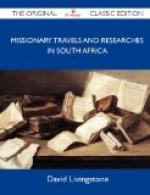The Bakalahari, who live at Motlatsa wells, have always been very friendly to us, and listen attentively to instruction conveyed to them in their own tongue. It is, however, difficult to give an idea to a European of the little effect teaching produces, because no one can realize the degradation to which their minds have been sunk by centuries of barbarism and hard struggling for the necessaries of life: like most others, they listen with respect and attention, but, when we kneel down and address an unseen Being, the position and the act often appear to them so ridiculous that they can not refrain from bursting into uncontrollable laughter. After a few services they get over this tendency. I was once present when a missionary attempted to sing among a wild heathen tribe of Bechuanas, who had no music in their composition; the effect on the risible faculties of the audience was such that the tears actually ran down their cheeks. Nearly all their thoughts are directed to the supply of their bodily wants, and this has been the case with the race for ages. If asked, then, what effect the preaching of the Gospel has at the commencement on such individuals, I am unable to tell, except that some have confessed long afterward that they then first began to pray in secret. Of the effects of a long-continued course of instruction there can be no reasonable doubt, as mere nominal belief has never been considered sufficient proof of conversion by any body of missionaries; and, after the change which has been brought about by this agency, we have good reason to hope well for the future—those I have myself witnessed behaving in the manner described, when kindly treated in sickness often utter imploring words to Jesus, and I believe sometimes really do pray to him in their afflictions. As that great Redeemer of the guilty seeks to save all he can, we may hope that they find mercy through His blood, though little able to appreciate the sacrifice He made. The indirect and scarcely appreciable blessings of Christian missionaries going about doing good are thus probably not so despicable as some might imagine; there is no necessity for beginning to tell even the most degraded of these people of the existence of a God or of a future state, the facts being universally admitted. Every thing that can not be accounted for by common causes is ascribed to the Deity, as creation, sudden death, etc. “How curiously God made these things!” is a common expression; as is also, “He was not killed by disease, he was killed by God.” And, when speaking of the departed—though there is naught in the physical appearance of the dead to justify the expression—they say, “He has gone to the gods,” the phrase being identical with “abiit ad plures”.




